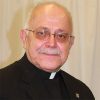Let’s be blunt about it. We see many Christians today flooding the news and social media with interpretations of Christianity that directly contradict Jesus’ teachings and proclaim other saviors of Western civilization.
The late Irish actor Richard Harris grappled with a similar situation in his poem titled “There Are Too Many Saviors on My Cross,” in which he slammed the complacency of Christians in the 1970s. (Google it. It’s worth the read.)
At that time, anti-war, civil rights and various liberation movements challenged people of faith to exit the sanctuaries of their churches and put their faith into action in the streets.
The so-called “prosperity gospel” that claims God wants us to be wealthy is just one distortion of the teachings of Jesus, who warns us specifically, “It is easier for a camel to pass through the eye of a needle than for a rich person to enter the kingdom of God” (Luke 18:25).
Another Gospel quote conveniently ignored comes from the Virgin Mary, who declares, “God has filled the hungry with good things but the rich he has sent away empty” (Luke 1:53). Worse, some Christians willingly put aside the entire Sermon on the Mount to confer messianic status on political figures whose policies violate Jesus’ command to love not just our neighbor, but our enemy.
Politicians and pundits alike think nothing of vilifying immigrants, disparaging the poor or mocking other races, all the while wearing a cross or crucifix around their necks. Clearly, it is easier to wear a cross than to bear one.
Jesus warns against such hypocrisy: “Not everyone who says to me, ‘Lord, Lord,’ will enter the kingdom of heaven, but only the one who does the will of my Father in heaven” (Matthew 7:21).
Today there seems to be no shortage of would-be “Messiahs” who invoke Christ for their own advantage but do not follow him. How are Christians to respond?
This is not a new phenomenon. In the 1930s, Dietrich Bonhoeffer, a German Lutheran pastor, witnessed with increasing alarm the rise of Nazism, which initially described itself as a Christian movement. Worse, Christians’ silence in the face of that evil was, in his view, more spiritually damaging than an open embrace of the Third Reich.
Bonhoeffer labeled such corruption of Christianity a “cheap grace” that expected forgiveness without repentance and conversion without consequences. In Bonhoeffer’s way of thinking, Christianity without the Cross is meaningless. He believed the only acceptable response to systemic evil was to oppose it any way possible. For such unflinching witness, Bonhoeffer was made to pay with his life in a concentration camp.
In our time, Jesuit priest, poet and activist Daniel Berrigan cut to the chase by stating, “If you want to follow Jesus, you better look good on wood.” Indeed, the invitation of Christ to his disciples is to leave behind our old way of thinking — and living — and pick up our cross, to follow him. Following where? Eventually to our own personal Calvary.
In the words of Saint Paul, “I have been crucified with Christ; yet I live, no longer I, but Christ lives in me” (Galatians 2:19-20).
Not every Christian is called to martyrdom like Dietrich Bonhoeffer, the four churchwomen of El Salvador, Sister Dorothy Stang, Father Stanley Rother or the Reverend Martin Luther King, Jr. Nevertheless, our individual Way of the Cross must lead us to the margins, to the outskirts, to the poor and oppressed: to all those whom the world deems unworthy or undeserving of support.
In the end, there is but one true Savior worthy of following, whose Cross means nothing less than our total self-sacrifice in service and solidarity with the poor.
Featured image: Maryknoll Father John Spain visits a mural portraying Saint Óscar Romero and Jesuit Father Rutilio Grande, both martyred in their country’s civil war. The mural is located in Father Grande’s hometown, El Paisnal. (Octavio Durán/El Salvador)

